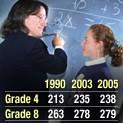The Nation's Report Card: Advance And Retreat?
 The New York Times reports very mixed results on the 2005 National Assessment of Educational Progress (NAEP) National and State Report Cards in Mathematics and Reading, also known as the Nation's Report Card:
The New York Times reports very mixed results on the 2005 National Assessment of Educational Progress (NAEP) National and State Report Cards in Mathematics and Reading, also known as the Nation's Report Card:Math scores were up slightly (see image) but eighth-grade reading showed a decline, and there was only modest progress toward closing the achievement gap between white and minority students, which is one of the Bush administration's primary goals. In many categories, the results indicated, the gap remains as wide as it was in the early 1990's.Get the actual Report Card right here.
Department of Education officials administered the test to 660,000 students in the 50 states and the District of Columbia, and on military bases around the world from January to March. It uses a 500-point scale, with scores assigned to achievement levels: below basic; basic, which denotes partial mastery of grade-level knowledge and skills; proficient, which represents solid performance and competency, and advanced, signifying superior performance.
This year's fourth-grade reading scores were almost flat, with the average score rising one point, but with 31 percent of students scoring proficient this year, the same percentage as in 2003. The decline in eighth-grade reading came as 31 percent of students scored as proficient, compared with 32 percent in 2003.
Fourth-grade students improved in math, with 36 percent scoring proficient, compared with 32 percent in 2003. Among the fourth-grade math scores there was another important gain, with the proportion of black students performing below basic declining to 40 percent from 46 percent.
Eighth-grade math scores also rose, with 30 percent of students proficient in math this year, compared with 29 percent in 2003.
Predictably, the House of Spellings is attributing student successes to the federal No Child Left Behind Act.
Heh. Remember when Secretary Spellings insisted that No Child Left Behind is not a mandate but a "partnership" between Washington and the states? That was a strange thing for the Secretary to say, especially in light of the fact that when a State displays a little too much independance, Spellings doesn't hesitate to crack the whip.
My guess is that in most classrooms, the Teaching Life will not improve as a result of this news, as working conditions and compensation aren't influenced by good news, but we definitely hear about it when the news is bad.
As for rising test scores, I believe that the rate of future increases will be subject to the principle of diminishing returns unless federal and state governments either substantially increase education funding, or, better yet, require that parents and students also be held accountable for academic progress.
But don't look for that to happen anytime soon. It's much safer politically for lawmakers to place the entire responsibility for insufficient progress upon "failing" schools. Parents are voters. And no lawmaker wants to run the risk of making such large block of voters angry with him or her.
Even though federal and state governments continue to take a more active role in the setting of education policy, the old maxim remains true: All politics is local.
Other Voices: Joanne Jacobs, also here, Eduwonk.com, Jenny D, Ms. Frizzle.









<< Home